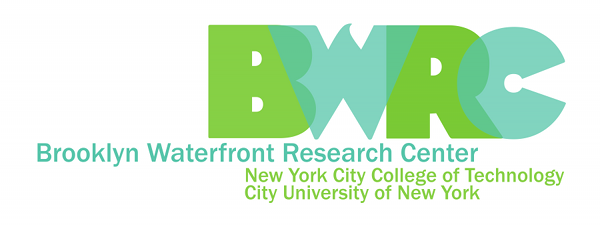BWRC hosted its final Breakfast Talk of the academic year on May 10th. Sunset Park Solar, New York City’s first community solar project owned and operated by a cooperative, is set to be installed on the roof of the Brooklyn Army Terminal. Currently, the Sunset Park Solar project team is comprised of four organizations that will collaboratively steward the project. Representatives from Solar One, New York City Economic Development Corporation (NYCEDC), UPROSE, and New York City Community Energy Cooperative (NYCCEC) joined BWRC in conversation about this innovative new project.
Louise Yeung, the Energy Portfolio Manager at the NYCEDC, oversees energy strategies for city-owned properties, like the Brooklyn Army Terminal in Sunset Park. Louise works as a liaison between the EDC and Sunset Park’s community organizations to ensure that the project receives the strategic support it needs.
Next, Juan Parra from Solar One walked the audience through an overview of the Community Solar model. Solar One, an environmental nonprofit in New York City, runs education and green workforce training programs and guides community organizations and housing providers through the solar installation process. The community solar model creates opportunities for tenants and homeowners to access renewable energy without having to install solar panels on their roof. In Sunset Park, the city-owned Brooklyn Army Terminal’s vast rooftop space is an asset for solar panel installation, allowing community members, mostly renters, to access solar energy without trying to modify their own rooftops. Parra pointed out that the large share of renters in the city presents a huge barrier to expanding solar panel installation – there’s simply not enough accessible rooftop space for tenants.
Sunset Park Solar aims to address the historical obstacles that have kept renters out of the renewable energy market. Subscribers to the Sunset Park solar garden system will be allocated a portion of the community-owned solar energy based on their historic electricity usage. Electricity generated by the solar panels is then exported to the electric grid, and Con Edison valuates this output. Subscribers will receive credits based on the value of electricity generated by solar, thereby dramatically lowering their monthly utility costs. Twenty percent of the credit value allocated by Con Edison to each subscriber is passed back to the cooperative. As of now, credits are set to be generated by early fall 2019.
Key to the success of this cooperative venture is the economic funding structure that has turned the seed of an idea into an executable community energy project. Shakoor Aljuwani, coordinator of NYCCEC and chairperson of Co-op Power, introduced the radical and economic-justice driven model of ownership that makes Sunset Park Solar so unique. Co-op Power, a regionally-organized network of Community Energy Co-ops, includes participating organizations across Western Massachusetts, Southern Vermont, and New York City. Co-op Power provides member organizations with technical and business support services and development resources, focusing on the importance of shared decision-making among members and creating a scalable, sustainable system. Over 750 households are grassroots investors in the Co-op Power network.
Finally, Lourdes Pérez-Medina, Climate Justice Policy & Programs Coordinator at UPROSE, discussed the Just Transition model around which her organization organizes. Just Transition emphasizes the importance of direct community participation, leadership, and shared ownership of resources in formulating climate solutions. UPROSE has been involved as a full partner in the Sunset Park Solar project, helping to guide the project formation and connect Solar One to critical community-rooted partners. Throughout the project’s roll-out, UPROSE will serve as a critical facilitator between the local community and Solar One.
At the heart of the Sunset Park Solar project is a dedication to building wealth and resilience among long-term, working class neighbors in South Brooklyn. As the project expands over the next year, the solar garden team aims to inspire other cooperative projects will generate renewable energy through cooperative economic models.



